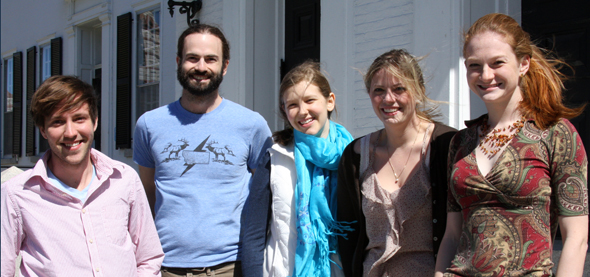
Menu
- About
- Academics
- Admissions & Financial Aid
- Student Support
- Diversity
- Postdocs
Back to Top Nav
Back to Top Nav
Back to Top Nav
Back to Top Nav
Back to Top Nav
Seven Dartmouth students have received prestigious National Science Foundation (NSF) Graduate Research Fellowships for 2012. The award will support their development as scientists and research into topics ranging from genetics and sea level rise to plant domestication and how creative pursuits change the brain.

From left: Dartmouth students Jesse Gomez, Alex Schlegel, Amy Baker, Anna Hatch, and Alexandra Giese are 2012 National Science Foundation Graduate Fellows. Not pictured are Thomas Kraft and Nicole Romain Looper. (photo by Joseph Blumberg)
“This is the largest number of these awards Dartmouth has had in a single year,” says Brian Pogue, dean of Graduate Studies and professor of engineering sciences at Thayer School of Engineering. “This represents a boom for science at Dartmouth and we hope the trend will continue in the coming years.”
According to the NSF, “As the oldest graduate fellowship of its kind, the Graduate Research Fellowship Program has a long history of selecting recipients who achieve high levels of success in their future academic and professional careers.” Previous fellows include U.S. Secretary of Energy Steven Chu; Google founder Sergey Brin; and many Nobel Prize winners.
The new fellows, who join 11 current Dartmouth students who are previous fellowship recipients, will each receive three years of support including a $30,000 annual stipend and a $12,000 cost-of-education allowance to the institution.
2012 Dartmouth NSF Graduate Research Fellows
Amy Elizabeth Baker: A first-year molecular and cellular biology graduate student, Baker has worked in Professor Michael Whitfield's laboratory, examining mechanisms of scleroderma pathogenesis. While she has yet to choose an adviser and department, she will likely continue in the field of genetics. “I am honored to be recognized for my dedication to research and incredibly grateful to the professors who have supported me to this point,” Baker says.
Alexandra Leigh Giese: Giese will be working with Professor Robert Hawley to study the future stability of the West Antarctic Ice Sheet and its potential contribution to sea level rise. “Funds from the fellowship program will allow me to investigate a new method that may increase the precision of ice flow modeling and better simulate future responses of the West Antarctica Ice Sheet to climate change,” says Giese.
Jesse Gomez ’12: Gomez, an undergraduate, has been studying cognitive neuroscience with Professor Bradley Duchaine, researching the perceptual mechanisms that underlie social cognition, such as recognizing faces. “I'm very interested in not only the brain, but how it changes from childhood to adulthood, and what that can tell us about the learning algorithms with which we're born,” says Gomez.
Anna Louise Hatch: Under the guidance of Professor Harry Higgs, Hatch is a second-year biochemistry graduate student in the molecular and cellular biology program. “I'm incredibly honored by and still slightly in shock from the NSF fellowship,” Hatch says. She is currently using simple lipid and protein systems to elucidate basic but profound mechanisms of self-organization in biological systems.
Thomas Kraft: Kraft is currently studying biological anthropology with Professor Nathaniel Dominy. He plans to use his fellowship to support field research in the Congo basin region of central Africa, where he will explore the origins of plant domestication and the foraging ecology of non-agriculturalist human populations. “I will study the interactions between pygmy hunter-gatherers and the wild plant foods they exploit,” Kraft says.
Nicole Romain Looper ’12: Looper, a mathematics major, has been conducting advanced mathematics research in an area known as Frobenius problems. “I was very honored and pleasantly surprised to have received the NSF fellowship,” Looper says.
Alex Schlegel: Schlegel is a second-year cognitive neuroscience graduate student working in Professor Peter Tse's laboratory. “We are interested in understanding the highly flexible mental abilities, such as learning, creativity, and symbolic thought, that differentiate human brains from those of other animals,” Schlegel says. One of his ongoing projects is a longitudinal study tracking changes in the brains of Dartmouth students as they study art or creative engineering design.
Additional current Dartmouth students who are NSF Graduate Fellows